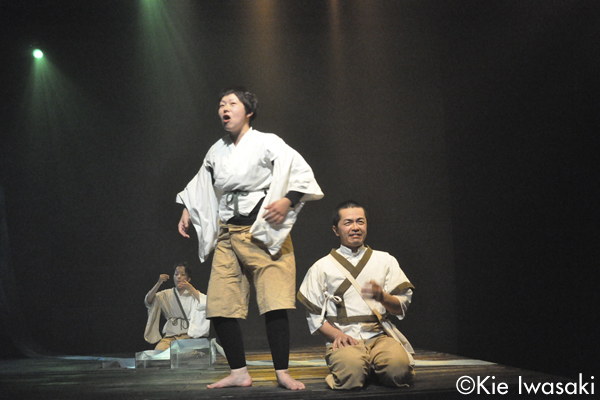

Cofuku Gekijo company
Mizu wo Meguru 3
(2012)
Photo: Kie Iwasaki
Data
:
Premiere: 2012
Length: 1 hr. 20 min.
Acts: 1 act
Cast: 4 (1 man, 3 women)
Mizu wo Meguru 3 (Concerning water 3)

Born 1967 in Miyakonojo city, Miyazaki Prefecture, Nagayama is a playwright and director. He is the representative of the theater company “Cofuku Gekijo” formed in 1990 and based at the culture centers of the two Miyazaki Prefecture cities of Kadogawacho and Mimatacho. His plays are characterized by the bringing of local folk culture and oral traditions into the daily life context to create works with the and using universality of fables, which are brought to life on stage through the use of the physical movement and vocal techniques of the Kyogen and Rakugo comedy traditions. In 2001, Nagayama’s play so bad year won the AAF Drama Award. This work and others are performed frequently by other companies, with one notable example being the play Konsui (Coma) that Nagayama wrote as an entry for the 2005 Tokyo International Arts Festival and was later staged as a play for two actors in 2009 by the leading actors Kenji Yamauchi and Kumi Hyodo of the Seinendan theater company with direction by Yudai Kamisato (Okazaki Art Theatre). Nagayama has also worked with director Motoi Miura of the Kyoto company Chiten, writing the plays Otogizoshi / gikyoku (Gekidan Urinko, 2010) and Kappa / aru shosetsu (Chiten, 2011). Since 2007, he has also created works at the Miyazaki Maarui Theater in which people with disabilities participate as actors. As a director, Nagayama has served as a theater director at the Miyazaki Prefectural Arts Center since October of 2006. Through activities such as his role as planner and director of productions of the “Engeki Jiku no Tabi Series” that brings together actors from theater companies in the Kyushu region, Nagayama is also known for his efforts to generate theater from the Kyushu and Miyazaki areas to the world audience.
Cofuku Gekijo company: http://www.cofuku.com
Miyazaki Prefectural Arts Center: https://miyazaki-ac.jp/


Cofuku Gekijo company
Mizu wo Meguru 3
(2012)
Photo: Kie Iwasaki
Data
:
Premiere: 2012
Length: 1 hr. 20 min.
Acts: 1 act
Cast: 4 (1 man, 3 women)
Among the characters is Watari, who plays multiple roles as a professor and Gagure (a
kappa
water sprite) and others. Behind a piece of cloth spread in the center of the stage representing a river is an old woman called Baa who sits there till the end of the play making motions of eating a meal slowly.
A man called Fukami (the name meaning “looking deeply”) begins speaking about a river as something that swallows words. Watari (whose name means “crossing”) makes an appearance as a professor at the university Fukami attends. Watari encourages Fukami to do research in an area that will benefit society, but he doesn’t heed the advice. In fact, the professor has already died, drowned when the river flooded.
The play shifts to a different time and place. A story is told of a baby girl that was picked out of the river by the 88-year-old Baa. People in the neighborhood of the river despise the infant as the child of a water sprite, but Baa has decided to name the baby Kou (meaning “river”) and is raising it. Narrating this story is Uta (a name meaning “song”), the daughter born of Kou when she grew up. Uta hums a song her mother taught her.
As Fukami is going upstream doing a survey of the river, he meets the younger brother of the professor, who is himself an associate professor. He goes so far as to warn Fukami that if he seeks out the headwaters of the river he will die, but Fukami won’t be stopped and walks on.
The next one Fukami meets along the way is a local wife. When he asks her a question, she won’t answer. When he shows her a folk dance of the locality, she answers with the same dance. She tells him, “There is a rumor running around that warns against answering the questions of outsiders.
Suddenly Gagure the water sprite appears and says he will lead Fukami to what he is looking for if he buys Gagure a meal. He agrees, but then meets Uta. Uta talks about memories of her mother and Baa. Listening to her, Fukami begins to recall memories of people he has lost. Uta says that song is prayer, and it is also solace and comfort for the weary soul. The two set out together for the headwaters of the river.
Along the way Uta continues speaking of her mother. Kou didn’t speak, even after she passed the age of ten. When Baa got old and couldn’t eat meals anymore, Kou spoke for the first time in baby talk, saying “unmaa” (food) to ask Baa to eat insistently. Hearing that voice gave Baa the strength and desire to eat again. As she grew older, Kou took in a young man that had come to do research on the river, the two were united and Uta was born. When the man went to find the headwaters of the river, he never returned. Uta says that is why she is going with Fukami to find the headwaters.
On a path in the mountains the two encounter a man whose body is becoming transparent. He says that since no one called him by it he can’t remember his own name and that is why he is disappearing. At the moment the man disappears the river stops flowing and all goes silent on the mountain. The two hurry on toward the headwaters.
It is a long path and the two finally sit down in exhaustion. Rain begins to fall. Uta is suddenly overcome with fear and grasps Fukami’s hand firmly. All at once, Uta begins telling her memory of heavy rain causing the river to flood and washing people away, and that Baa and Kou are among those carried away by the flood.
Uta’s words cause Fukami to begin speaking the truth about himself. He has no memory and he only uses the name of an old man he met once on the banks of the river as his own. He says that the people he meets on his journey are all phantoms that the shine maiden Watari, serving as a spiritualistic medium has called forth from the dead. The man (Fukami) asks Watari to serve as a medium for him again, but she refuses, saying that she has already died and crossed the river into the land of the dead. As she parts with him, Watari says that if he, now among the living will tell stories about the people who have died, they will continue to exist for long years to come.
Now alone together, Uta gives the man a new name, Shizuku (meaning a drop of water), and they set off again in search of the headwaters that bring life. The two press on, repeatedly calling out the word that gives life, “unmaa.” In her continued silence at the back of the stage, Baa now appears to be giving the two her blessing.
Finally the two become like the old man and his wife that lived in some place long, long ago at the start of the famous folk tale.
Related Tags